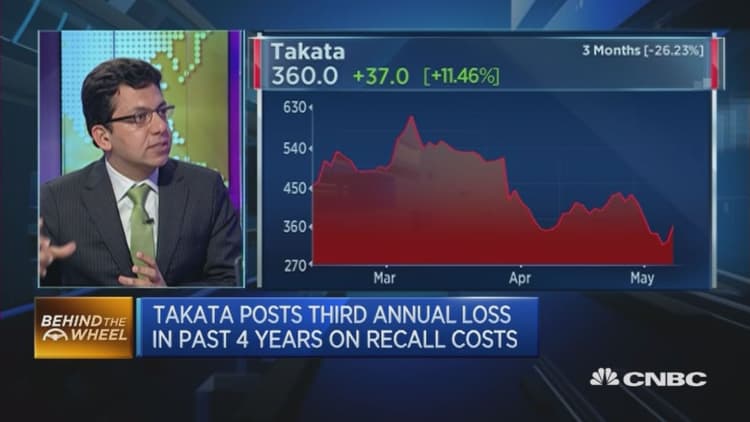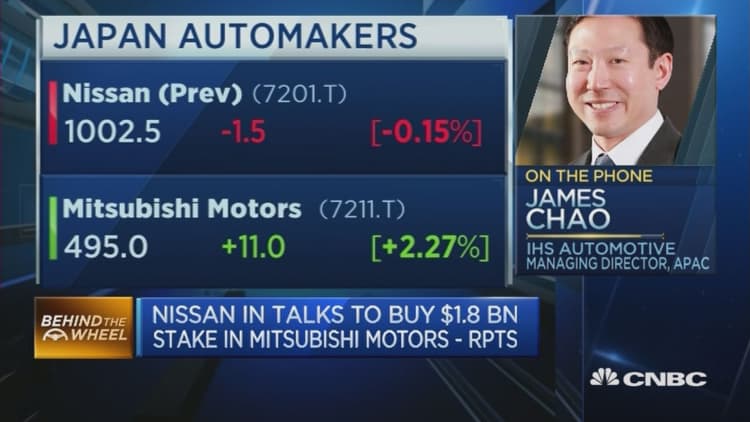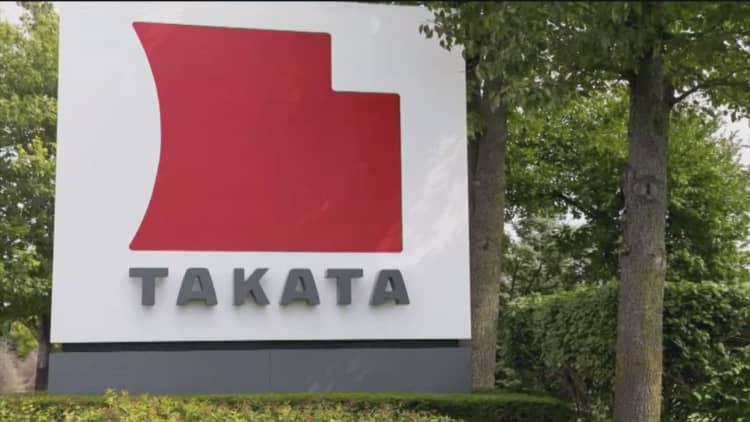


Hawaii took the Japanese auto parts maker Takata to court on Friday, accusing it of covering up a deadly airbag defect and demanding a $10,000 penalty for every affected car owner in Hawaii.
The lawsuit, filed in Hawaii's First Circuit Court, makes Hawaii the first state to sue Takata over its faulty airbags. The lawsuit also names Honda Motor, the automaker most affected by the continuing mass recalls of Takata airbags, as a defendant, and demands that each company do more to raise awareness of the dangers the defect poses to car owners.
"We're not going to sit back and wait for more accidents to happen," Steve Levins, the state's director of consumer protection, said in an interview. "We're also seeking that consumers be compensated for any losses associated with this incident, whether that's alternative transportation costs, or a diminished value of their vehicle."
Read more from the New York Times
A $1 billion Apple investment as a way to placate China
Honda expands Takata airbag recall
Minnesota law school, facing waning interest, cuts admissions
At least 10 deaths in the United States, and three overseas, have been linked to the defect, which can cause pressure to build up in and rupture the steel interiors of the airbags, sending metal debris flying into the car's cabin. More than 100 people have been injured.
Hawaii's lawsuit says that its residents are at particular risk because of the state's high temperatures and humidity levels. Auto safety regulators have determined that long-term exposure to moisture and temperature fluctuations over time can degrade the explosives, or propellant, used to deploy the airbag, making it more unstable and prone to cause the airbag's interior to rupture.
Based on those findings, the National Highway Traffic Safety Administration this month ordered Takata to work with automakers to recall an additional 35 million to 40 million airbags nationwide, bringing the number recalled in the United States to 64 million. Automakers had initially limited some of their recalls to humid regions, including Hawaii, Florida, Puerto Rico and the Virgin Islands.
Now, the recalls span the globe. A senior executive at Honda, Takata's biggest customer, said on Friday before the suit was filed that it planned to recall 21 million more vehicles worldwide to fix Takata's defective airbags, bringing its global tally to to 51 million vehicles.
The Honda executive, vice president Tetsuo Iwamura, did not specify how many of the vehicles that Honda plans to recall are in the United States or other countries. But many of the vehicles are likely to be part of the American recall expansion.
Hawaii is not seeking compensation for crash victims. Instead, it demands that Takata reimburse or otherwise provide relief to car owners affected or otherwise inconvenienced by the recalls. No airbag ruptures have been confirmed in the state, though Mr. Levins expressed concern that there were rupture incidents local authorities were not aware of.
The suit also seeks civil penalties of as much as $10,000 against Takata and Honda for every car owner affected, for violation of Hawaii's consumer protection laws. About 70,000 cars have been recalled in Hawaii over Takata airbags, Mr. Levins said, meaning the suit could end up costing Takata and Honda $700 million each, on top of possible restitution or injunctive relief costs.
Takata and Honda did not immediately respond to a request for comment on the suit. Takata has said in the past that it is cooperating with all investigations into its conduct and is ramping up its production of replacement parts. Other airbag makers are also helping to supply parts.
The state's Office of Consumer Protection was set to brief reporters on the lawsuit on Friday in Hawaii.
Hawaii's suit creates another headache for Takata, which already faces a Justice Department investigation, a barrage of personal injury claims and a class-action suit brought by affected car owners.
It remains unclear whether other states will file similar suits. But it is common in situations that extend across state borders for multiple states to file similar suits.
Though Takata and Honda were alerted to an airbag rupture in a Honda Accord as early as 2004, the manufacturers did not alert authorities, nor did Honda start recalling the cars until 2008. It initially recalled only 4,000 vehicles, attributing the ruptures to a limited manufacturing problem.
In November, the National Highway Traffic Safety Administration imposed a $70 million penalty on Takata for failing to promptly disclose defects in its airbags. That penalty could increase by $130 million if Takata does not meet the terms of the agency's consent order, which would be a record civil punishment for the auto industry.
The mounting recall, legal and regulatory costs have put Takata's financial viability in doubt. On Wednesday, the company, which is based in Tokyo, confirmed a net loss of about $120 million for the financial year that ended in March, and said it was looking for ways to restructure its business. Analysts say Takata needs a major infusion of capital from banks, investors or even a buyer to stave off the prospect of a bankruptcy.
At the same time, automakers face an enormous logistical challenge in replacing the faulty airbag parts. Not only are there insufficient parts for the millions of recalled cars, but some car owners who have already replaced their airbags must eventually have them serviced again because their replacement parts may also be faulty.
Others drivers report being told to wait for months for replacement parts. In some cases, automakers have made loaner cars available. Car owners can check if their vehicles are affected by the Takata recalls on the N.H.T.S.A. website.
Jonathan Soble contributed reporting.




